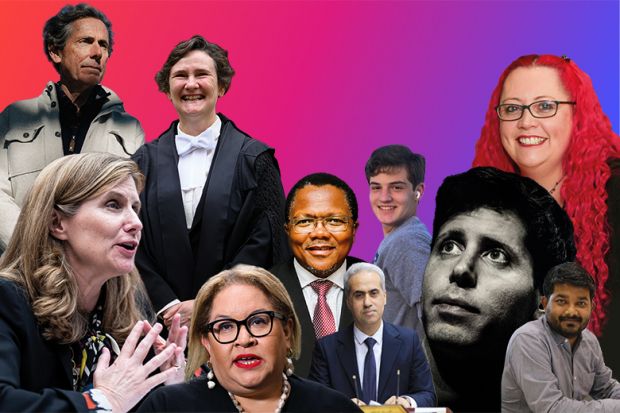Sam Altman
As is the fashion for tech leaders, Sam Altman doesn’t have a university degree. Instead, in 2005, he followed the well-worn path of dropping out of Stanford University to co-found a social networking site, Loopt. This fuelled a career in Silicon Valley and, eventually, the founding of OpenAI, the company that arguably changed higher education forever in 2023, if we are to believe the thousands of academic-penned think pieces sparked by the global takeover of its most famous product, ChatGPT. Such was the domination of Mr Altman this year that even briefly losing his job during a bitter row over AI ethics did not derail him. And this chaos may be a sign of things to come as the repercussions of ChatGPT’s popularisation of the large language model continue to take hold, no less so in universities, where the myriad threats and opportunities AI poses are only just beginning to be understood.
Tom Williams
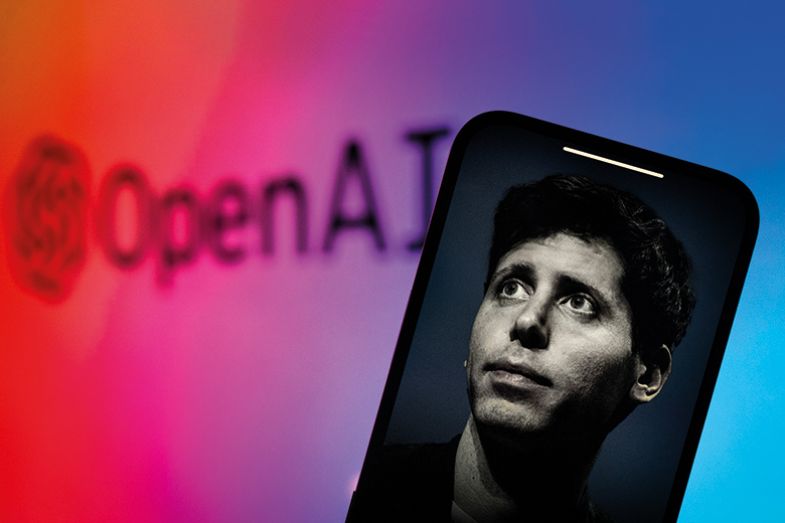
Theo Baker
Theo Baker has had some advantages in life. His parents are both highly renowned journalists who enrolled him in Phillips Academy Andover before he won acceptance to Stanford University. There – whether driven by a sense of moral injustice or journalistic opportunism – the freshman saw signs that Stanford’s president had been involved in some research publications of questionable ethics, and he decided to pounce. That set off months of investigative work at the Stanford student newspaper that led to a formal university investigation and, ultimately, the resignation of the president, Marc Tessier-Lavigne. Along the way, Mr Baker pushed past repeated legal threats from Professor Tessier-Lavigne’s lawyer to become the youngest winner of a George Polk Award for journalism. The episode is one of many in the US showing the growing importance of college journalism for institutional accountability at a time of heavy cutbacks throughout the media industry. And for Mr Baker, it is a reminder of what he acknowledges is his great luck in being at Stanford.
Paul Basken
Edward Blum
Edward Blum was raised in a liberal Jewish household in the middle of the civil rights movement and was taught by his parents about the importance of treating people equally. In adulthood, he became a stockbroker and adopted a belief that race should neither help nor harm a person in their life. From there, he founded the conservative activist group Students for Fair Admissions, and embraced the role that has made him one of the most influential people in all of US higher education. After years of repeatedly losing challenges to affirmative action in university admissions, Mr Blum broke through in 2023 with wins against Harvard University and the University of North Carolina, and arguably the rest of academia, greatly aided by a US Supreme Court stacked with Trump-appointed conservatives. The son of a shoe salesman now plans to use his overwhelming victory over higher education to catapult a campaign to remove racial preferences throughout US society.
Paul Basken
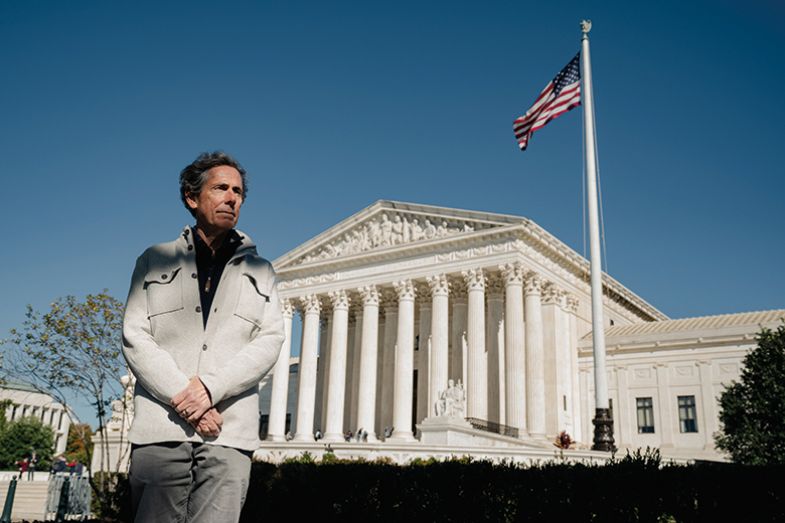
Sakhela Buhlungu
South Africa is home to some of the continent’s greatest universities, but too many of them are plagued by poor leadership and corruption. Most column inches have been devoted to the travails of Mamokgethi Phakeng, who resigned as University of Cape Town vice-chancellor in February this year and, according to a subsequent inquiry, subverted UCT policies to avoid accountability while using threats, intimidation and ethnic slurs. She has described the report as “inaccurate”. Attention has also focused on an independent report’s findings of “intimidation, bullying, [and] maladministration” at the University of South Africa. But other leaders have taken a different path. Sakhela Buhlungu, vice-chancellor of the University of Fort Hare, has made it his mission to tackle the “cancer” of fraud at his institution, despite deadly consequences, including the assassination of several staff members, among them Professor Buhlungu’s bodyguard – amid suspicions that the vice-chancellor was the real target. “The fight continues. We are not going to stop,” he has said.
Patrick Jack
Sabyasachi Das
Scholars across Asia continue to face severe threats to their academic freedom. The case of lecturer Sabyasachi Das is a prime example of their vulnerability, even at private institutions. When the Ashoka University economist published a preprint article in July accusing India’s ruling Bharatiya Janata Party (BJP) of meddling in election results, he triggered a political storm – and the end of his career at Ashoka. Following Dr Das’ paper on “electoral backsliding”, intelligence services reportedly raided the campus. The university distanced itself from Dr Das, cautioning against too hasty an interpretation of the research. Separately, some scholars cited methodological concerns. Even so, Dr Das received broad support from the academic community. In August, more than 300 academics signed a letter denouncing his “forced ‘resignation’” and demanding his immediate reinstatement. Members of Ashoka’s economics and political science faculties threatened walkouts, according to reports. Ultimately, however, Dr Das resigned – his departure a warning bell to government-critical academics.
Pola Lem
Megan Davis
Few speeches in Australian academic circles have captivated like UNSW Sydney lawyer Megan Davis’ opening keynote at this year’s Universities Australia conference. Professor Davis co-authored the Uluru Statement from the Heart, the underpinning document of this year’s referendum to enshrine an Indigenous advisory body in the Australian constitution. In a powerful presentation, she outlined the historical, constitutional and political context for the reform. And she had a heartfelt message for universities: support the “yes” vote. While most did, the referendum failed, prompting soul-searching about the prospects for any future changes to Australia’s 130-year-old constitution. The issue has also rekindled soul-searching about the role of universities: should they take sides in the big political issues of the day? They take sides in an operational sense, through affirmative action policies for Indigenous students or “zero tolerance” declarations about discrimination. Is taking an institutional stance on broader societal issues so different? Like Indigenous reconciliation, this question will not be resolved any time soon.
John Ross
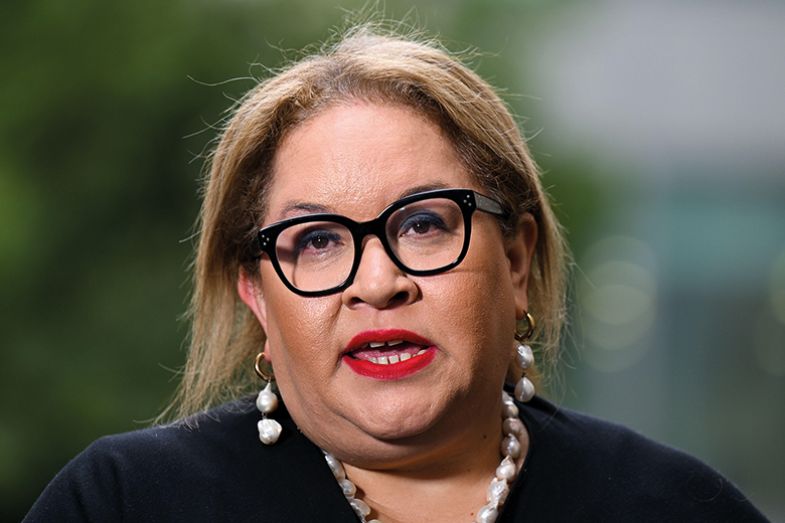
Elizabeth Magill
The Israel-Palestine conflict has long been a dividing line on campuses around the world, and tensions have multiplied in the wake of Hamas’ 7 October attacks and the subsequent – and intensifying – Israeli retaliation. Among politicians in many Western nations and, in the US in particular, donors, concern has focused on pro-Palestinian demonstrations on campuses that, according to some accounts, have strayed into antisemitism and left Jewish students feeling unsafe. On the flip side, politicians and university leaders have been accused of not doing enough to protect academic freedom, creating a “chilling effect” in debate about Palestine. The UK’s key flashpoint came when UK Research and Innovation suspended an equality committee at the behest of the science secretary, Michelle Donelan, who accused some of its members of sharing “extremist social media posts”. The biggest scalp, however, came in the US, when University of Pennsylvania president Elizabeth Magill was forced to resign after an appearance before a congressional hearing in which she failed to directly answer whether student protesters calling for the genocide of Jews would be in breach of the university’s code of conduct.
Chris Havergal
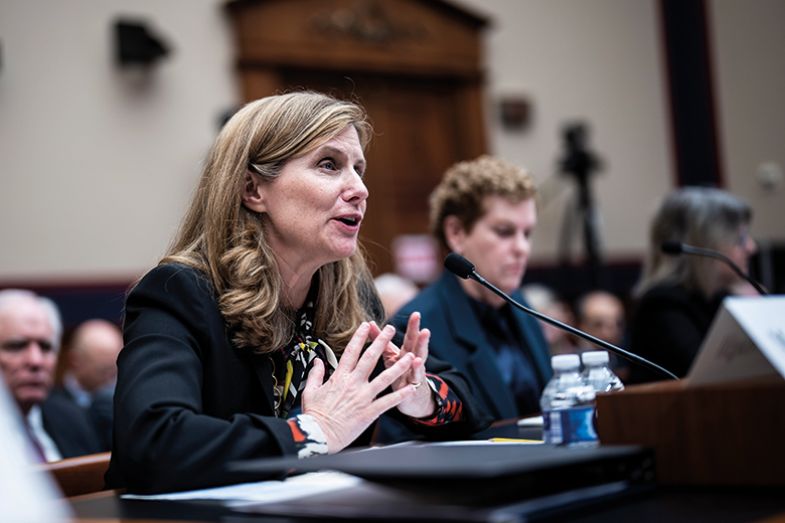
Sufyan Tayeh
The war in Gaza has dealt severe blows to higher education on both sides. In Israel, much research has ground to a halt after army reservists were called up, while many international staff have fled. The impact in Gaza and the West Bank has been more destructive, with 11 universities “completely or partially damaged” in just the opening weeks of the conflict, and disruption to the learning of tens of thousands of students. At the heart of every war, however, is human tragedy. Staff and students were among those killed in Hamas’ cross-border attacks of 7 October, including 26 from one border institution, Sapir Academic College. And as Israel’s retaliation has intensified, so has the death toll in Palestinian academia. The Palestinian Ministry of Higher Education said more than 400 students and staff had been killed in the opening weeks of the conflict, and this figure has continued to rise since then. Among the most high-profile victims was Sufyan Tayeh, president of the Islamic University of Gaza, who was killed with his family in an air strike.
Chris Havergal
Irene Tracey
The world always listens when Oxbridge vice-chancellors speak, but those who have held the roles of late have not always attracted the kinds of headlines that they wanted. Since she took over the position in early 2023, the University of Oxford’s new vice-chancellor, Irene Tracey, has been a breath of fresh air, establishing herself as an honest and approachable sector leader with big ideas for the future. While making the day-to-day concerns of staff a priority with promises of action on working conditions and sector-level funding, Professor Tracey has not neglected the wider picture, with well-timed and insightful interventions on climate change and free speech. A major government review of spin-out companies that she oversaw also gained plaudits, as has her work on getting more women into science. Under her watch, Oxford still has a lot to do, but early signs show that the institution’s gamble of appointing a previously little-known insider to take on the top job seems to have paid off.
Tom Williams
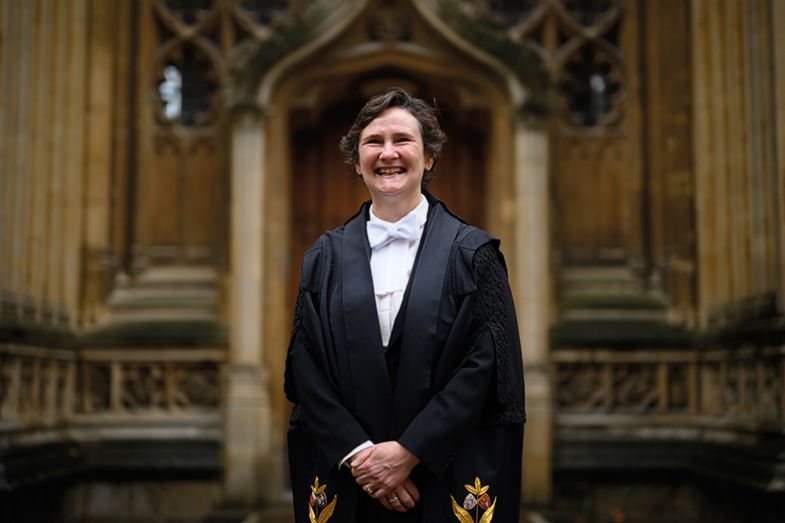
Siouxsie Wiles
While the Covid pandemic highlighted the social mission of universities, it also highlighted the personal toll. Worldwide, one in four academics who offered public commentary on the pandemic reported being physically intimidated. One in seven attracted death threats. New Zealand’s most prominent Covid commentator, University of Auckland microbiologist Siouxsie Wiles, was no exception. She was put on a “citizen’s arrest” list and threatened with jail, rape and execution. This year, Dr Wiles has taken her employer to court, saying that instead of supporting her it told her to tone down her commentary. The university has emphatically rejected the accusation, submitting a six-page list of actions that it took to safeguard her well-being. The court decision, expected in mid-2024, will no doubt be scrutinised around the world. The case highlights a broader issue around universities’ obligation to guarantee academic freedom while ensuring the safety of their most visible academics.
John Ross
Register to continue
Why register?
- Registration is free and only takes a moment
- Once registered, you can read 3 articles a month
- Sign up for our newsletter
Subscribe
Or subscribe for unlimited access to:
- Unlimited access to news, views, insights & reviews
- Digital editions
- Digital access to THE’s university and college rankings analysis
Already registered or a current subscriber? Login
